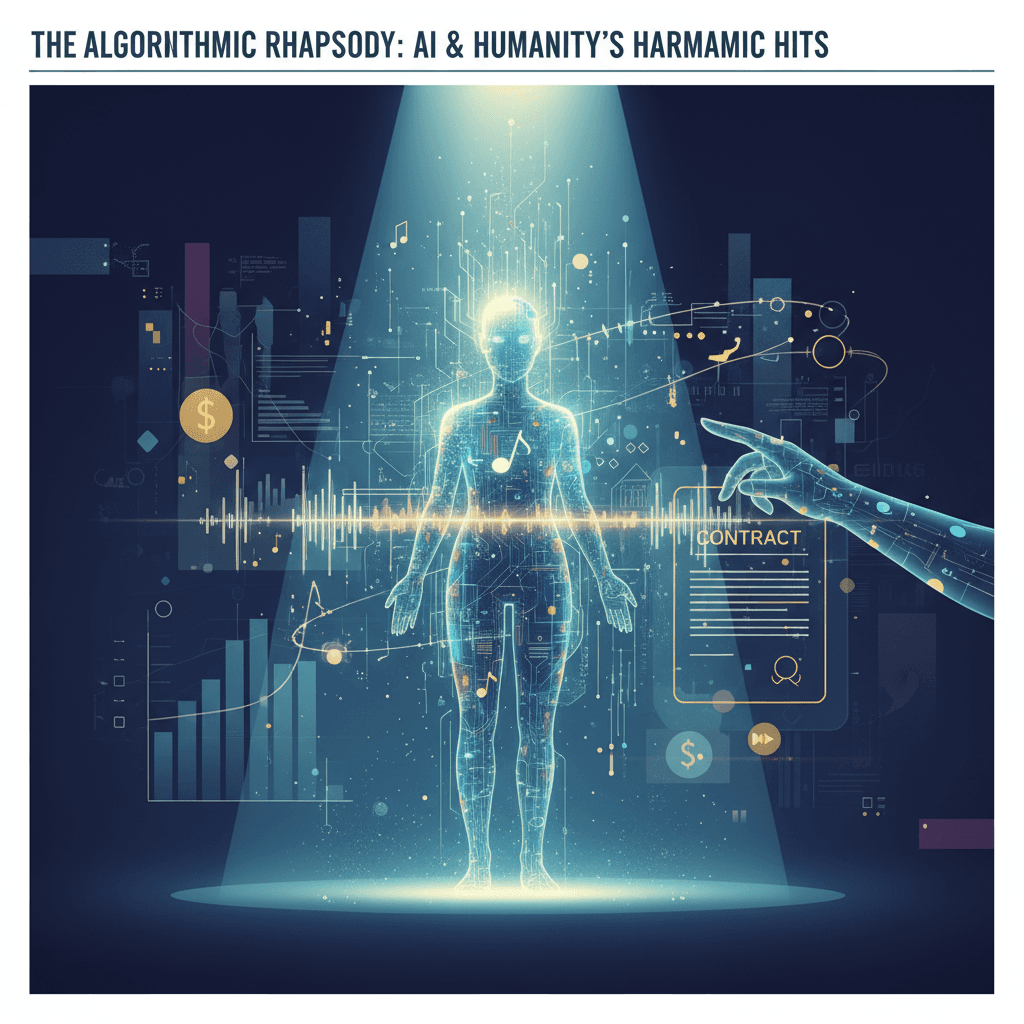Human-Backed AI Artist Xania Monet Lands Landmark $3M Music Deal
A $3M deal propels an AI artist to stardom, revealing the human creativity powering music's technological frontier.
September 20, 2025

A multimillion-dollar record deal has placed a new, and distinctly non-human, artist in the music industry spotlight, signaling a watershed moment for the role of artificial intelligence in creative fields. Hallwood Media, an independent label founded by former Interscope Records executive Neil Jacobson, has signed the AI artist Xania Monet in a deal reportedly worth up to $3 million.[1][2][3] This landmark agreement moves AI-generated music from a technological novelty to a commercially validated asset, sparking both excitement for innovation and intense debate over the future of artistry, copyright, and the economic landscape for human musicians. Xania Monet is not a person, but a digital persona whose music has rapidly gained traction, landing on several Billboard charts and accumulating millions of streams.[1][2] The deal represents one of the most significant financial commitments to an AI-generated musician to date and forces the industry to grapple with the increasingly blurred lines between human creativity and machine generation.
The deal between Xania Monet and Hallwood Media is a calculated venture into what many see as the next frontier of the music business. The agreement followed a bidding war for the AI artist, whose catalog had already amassed 9.8 million streams in the U.S. even before the deal was finalized.[1][3] Hallwood Media, led by Jacobson, has positioned itself at the forefront of this emerging trend, having previously signed another AI music creator, imoliver, from the same platform.[4][5] Jacobson, a former president of Geffen Records, views these AI creators not as a gimmick but as "the future of our medium," representing a new intersection of technology and taste.[5][6] The label's investment in Xania Monet underscores a strategic shift in talent acquisition, moving from traditional artist scouting to identifying promising creators on AI music generation platforms. This approach allows for an accelerated form of artist and repertoire (A&R), where compelling music can be generated and market-tested with unprecedented speed.[7]
Behind the AI persona of Xania Monet is a human creator, Telisha "Nikki" Jones, a 31-year-old poet and designer from Mississippi.[1][8][4] Jones utilizes the generative AI music platform Suno to transform her poetry into fully produced R&B and gospel songs.[1][9] She provides the lyrical foundation, drawing heavily from personal life experiences, with her manager Romel Murphy stating that about 90% of the lyrics are her own.[1][4] Jones, who grew up singing in church but admits she is not a vocalist who could have secured a record deal on her own, uses Suno to generate the vocals and instrumentation.[1][10] This human-AI collaboration is central to the project's identity; while the "artist" is virtual, the lyrical content is deeply human.[2][3] This distinction is crucial, as Jones retains full ownership of the songwriting and production credits, a factor that likely played a significant role in securing the record deal.[2][4] The success of songs like "How Was I Supposed to Know," which hit No. 1 on Billboard's R&B Digital Song Sales chart, demonstrates the powerful combination of Jones' authentic lyrical voice and the AI's production capabilities.[1][3]
The signing of an AI artist to a major deal has sent ripples throughout the industry, magnifying an already intense debate about the implications of generative AI. The core of the controversy revolves around copyright, compensation, and the very definition of art.[11][12] AI music platforms like Suno are currently facing copyright infringement lawsuits from major record labels, who allege the models were illegally trained on vast catalogs of protected music.[1][13][14] This legal uncertainty caused some larger labels to hesitate during the bidding for Xania Monet.[1][4] The U.S. Copyright Office has stated that works created solely by AI are not eligible for copyright, but works with sufficient human authorship can be protected.[15] Xania Monet's model, where a human writes the lyrics, complicates and potentially strengthens the case for copyrightability.[12][16] Beyond the legal questions, many human artists have expressed frustration, viewing the rise of AI-generated music as a threat to their livelihood and the authenticity of music itself.[8][17] Grammy-nominated singer Kehlani voiced her disapproval, stating, "I don't respect it," arguing that the AI is doing the work a human artist traditionally would.[8][10] This sentiment highlights a fear that AI could devalue human creativity and oversaturate the market with machine-made tracks.[18][7]
In conclusion, the $3 million deal for Xania Monet is far more than a simple business transaction; it is a catalyst for profound change within the music industry. It validates AI-generated music as a commercially viable product and pioneers a new model of artist creation that blends human input with artificial intelligence. The arrangement with Telisha Jones as the human songwriter behind the AI artist provides a potential, albeit complex, answer to pressing questions of authorship and ownership.[2][4] However, this development also intensifies the urgency of resolving the significant legal and ethical challenges that generative AI presents, from ongoing copyright battles over training data to the existential concerns of human artists about their future role.[11][1] As plans for a live performance for Xania Monet are reportedly in the works, the industry and audiences alike will be watching closely to see whether this new breed of AI-human collaboration can establish a lasting and meaningful place in the cultural landscape or if it will remain a controversial footnote in the history of music.[2][3] The success or failure of ventures like this will undoubtedly shape the legal frameworks, economic models, and creative norms for years to come.
Sources
[1]
[7]
[8]
[10]
[11]
[12]
[13]
[14]
[16]
[17]